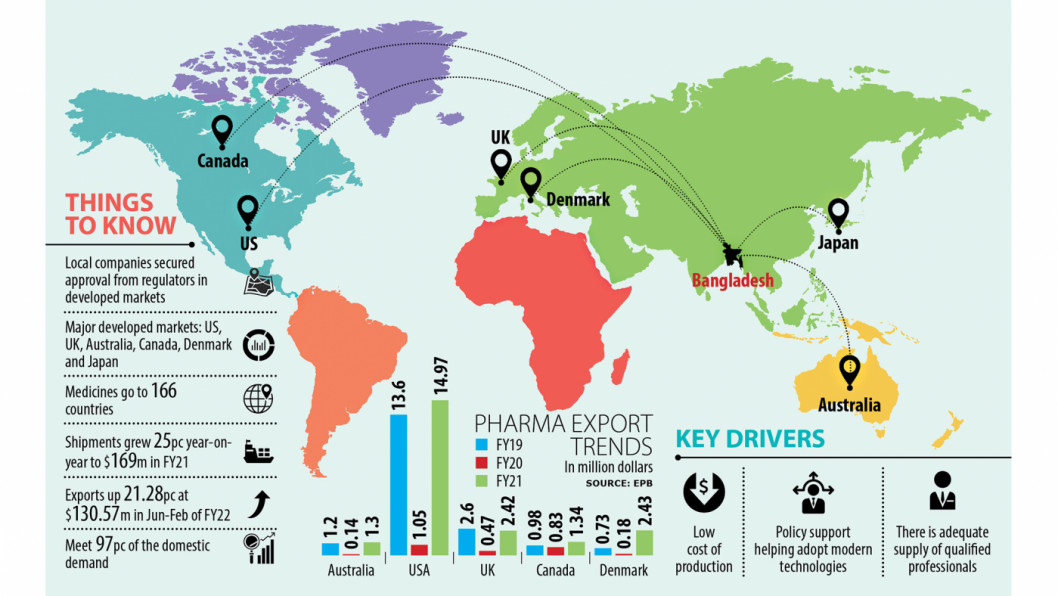Driven by access to regulated destinations, cheap products, high quality
Medicine exports to the developed countries are steadily growing riding on the attainment of regulatory approval from the US, European and some other countries helped by Bangladesh’s capacity to produce high-quality drugs at affordable prices.
As a result, shipment rose significantly in the markets of the US, the UK, Australia, Canada, and Denmark in the last three years.
This marks a major change in the pharmaceuticals industry since it largely relies on the Asian and African markets as overseas destinations and the domestic market to drive growth.
Bangladesh shipped drugs worth $14.97 million to the US in the last fiscal year of 2020-21, strongly rebounding from the coronavirus-induced slowdown a year ago when manufacturers could bring in $1.05 million only.
The shipment stood at $13.6 million in FY2018-19, data from the Export Promotion Bureau (EPB) showed.
Among the developed countries, Denmark has emerged as the second-largest export destination for Bangladesh, with receipts surging nearly 14 times to $2.43 million in FY21 from $0.18 million in FY20.
The exports to Canada rose to $1.34 million in FY21, up 62 percent from $0.83 million the year prior.
Medicine sales fetched $2.42 million from the UK in the last fiscal year, an increase from $0.47 million in FY20 but a decrease from $2.6 million in FY19.
The shipment is increasing in Japan and Australia as well. And the upward growth in overseas sales has been driven by the market access to the highly regulated markets.
In a major development, the US Food and Drug Administration (US FDA) has given approval to a facility of Eskayef Pharmaceuticals Ltd, an achievement that would allow the company to enter the world’s largest drug market.
The medicine-maker submitted an abbreviated new drug application, which contains data submitted to the US regulator for the review and potential approval of a generic drug product, for Pregabalin capsules in eight different strengths: 25mg, 50mg, 75mg, 100mg, 150mg, 200mg, 225mg, and 300mg.
In August 2016, Bangladesh entered the US market through Beximco Pharmaceuticals Ltd, a manufacturer of generic drugs and active pharmaceutical ingredients.
Square Pharmaceuticals has also secured FDA approval.
“Our pharmaceuticals products are being increasingly accepted in developed countries as we produce cheaper, high quality, and patent-free medicines,” said Prof ABM Faroque, a former dean of the Faculty of Pharmacy at the University of Dhaka.
“There is no question about the quality of our products as we can manufacture world-class lifesaving medicines. Besides, we can make any generic version of drugs that are helping us enter the market of the developed countries.”
Another factor, according to him, is pharmaceuticals products produced in Bangladesh are cheaper than in any other country owing to lower production costs as companies can hire professionals and skilled human resources locally.
“So, our pharmaceuticals products are competitive in the developed countries as well,” Faroque said.
“The gateway to the most-coveted market in the world is now open for Eskayef as we have secured the most prestigious and stringent FDA approval,” said Mohammad Mujahidul Islam, executive director for marketing and sales of Eskayef Pharmaceuticals.
Bangladesh has already had a strong footprint in the pharmaceuticals market of Africa and Asia. “Now, the time has come to expand to regulated markets,” Islam said.
Abdul Muktadir, chairman and managing director of Incepta Pharmaceuticals Ltd, says local pharmaceutical companies are manufacturing high-quality drugs and are getting approval from international regulatory bodies.
“This is raising our exports to the developed countries. Now we are in the initial stage. The export will go up rapidly in coming days.”
He thanked the regulators of Bangladesh for extending support to local medicine makers to explore opportunities in the foreign markets.
Beximco Pharmaceuticals accounts for 90 percent of the medicines shipped to the US, said an official of the company.
Before entering a regulated market, a company has to obtain a good manufacturing practice certification from the regulatory body of the importing nation, according to Monjurul Alam, global business director of Beacon Pharmaceuticals.
Pharmaceuticals shipments from Bangladesh grew 25 percent year-on-year to $169 million in FY21 thanks to the addition of anti-coronavirus drugs to the export basket, continuous improvement of quality, and policy support.
Overseas sales brought in $130.57 million in the June-February period of FY22, up 21.28 percent year-on-year, according to the state-run EPB.







